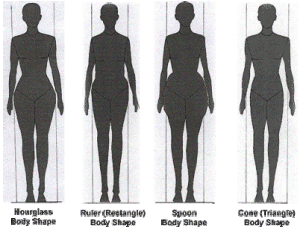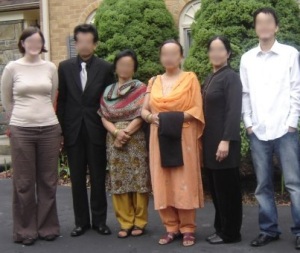This story is relatively infamous within my immediate family.
A few years ago, while studying in India I received an email from P. It basically said, “Can you please contact your sister K. I’m afraid my father said something that really upset her and I don’t really know how to handle it.” Meanwhile I started to get ranting emails from my youngest sister, M, talking about something P’s father had done to K. So I wrote back to P and asked, “What the heck happened?”
My sister K and P’s cousin-sister*, coincidentally, both went to the same undergraduate university. When P graduated from our school his father came to the States for the first time and stayed for about 6 months. For a good chunk of his visit he lived with P in New York. On weekends they would travel around seeing the sights and visiting people. One such weekend they visited our “sisters’” college. P took both the “sisters” out for dinner with his father, and while driving back from the restaurant he watched his dad say something to K in the rear-view mirror and then K’s face crumple up like she was upset. He was pretty sure he knew what his dad said, but didn’t know how to react because he didn’t want to hurt his father’s feelings by correcting him in front of everyone, and he also didn’t want K to be upset but it wasn’t the right time or place to explain the cultural intricacies.

Everybody is different
So by the title of this post, I’m sure you can imagine what he said to her. He basically asked her why she was “so fat.” I think the exact phrasing was something like, “why are you so puffy fat? Do you exercise?” (although the actual use of the word “puffy” is debatable. It is what my sister swears she heard, but its hard to imagine that “puffy” is part of P’s dad’s English vocabulary.) In any case, he meant it completely innocently, and was probably not really aware that he hurt my sister’s feelings.
Anyway, in a place like America, where obesity is rampant, my family’s waist size doesn’t deviate that much from average. Some people are bigger, and some are smaller, but no one is dangerously heavy. However, like most Americans, people in my family are sensitive about weight. If I lost 5 pounds, I’d love for someone to compliment me, but the big taboo is not to mention if I gained 5 pounds, at least not from someone I just met! It can be quite insulting.
Neither of my sisters have ever forgotten that incident. In fact, K even used it for a “cross-cultural misunderstandings” report she had to do for one of her education classes. I was actually probably lucky, because K is a lot more quiet and calm. Had P’s dad made this mistake with my youngest sister M, she probably would have screamed at him. Which would have complicated this sensitive cross-cultural situation even more.
Over the years I have learned that P’s dad, in particular, is pretty bad about this “taboo.” Mostly because it isn’t taboo at all to talk about weight in Nepal. In fact, in most cases, it is a compliment to say that someone is looking bigger. It means you are eating well, and if you are eating well, then you are probably also doing well financially. A Nepali euphemism for “fat” is “healthy.” I mean, healthy sounds like a positive word, right? “You are looking so healthy these days!” is one way of saying, “wow, you’ve grown larger, looking good!”

Me, P's dad, P's mom, P's Phupu, family friend, and P's brother U... as you can see I'm towering over the ladies
Yet even if you know this cultural tidbit about Nepal, it is still (in my American mind) not fun to be called fat, compliment or not. For example, I just knew that when P’s family came for the “epic family visit of 2008” that one of the first things his dad would say after getting off the plane was something about my weight. I think I’m totally average sized, for a Caucasian, but sometimes hanging out with some Nepali female friends who tend to be a bit shorter and skinnier, it can distort the way you look at yourself and in turn make comments about weight sting even a little bit more.
As expected, as P’s family walked through the departure gate, pushing their luggage carts in our direction, his dad came over to say hello and give us a hug/pat on the back. Then he squeezed my forearm and chuckled, “C you’ve grown so large!” Cringe.
I just knew we had to say something to them. During the family visit, P’s mother, father and Phupu (aunt- literally “father’s sister”) were going to travel to Virginia to stay for two days with my mother and sisters. This was already an awkward visit on so many levels (and I’ll discuss this some other time), but one of the big things that we had to instill in them was that talking about weight—especially heaviness—was absolutely against the rules of engagement.

Scolding is bad during first impressions...
My mother had already had that conversation with me: “They are in America now, so they need to learn about our culture as well… I will not tolerate people calling us fat. If they do, I don’t mind telling them to their face that it is wrong.” While she was right about the cultural sensitivity thing, I also wanted to make a good first impression, so impromptu rudeness lessons from my mother were not part of my plan. I made sure that P had time to talk to his family about this and I’m really lucky that they are willing to see things from another perspective.
On the way down to visit my mother we inevitably stopped at R and S’s place. S’s parents were also visiting at the time. As the two families were chatting J Phupu basically said, “You are all looking so healthy!” Then she leaned in and said, “I learned that you can’t say fat in America!”
Well… at least it is a step in the right direction.
I think that P’s family has become more sensitive about the “fatness” thing. In fact, I can’t remember them saying anything while we were in Nepal this summer. Well… they did say I had a nice body for a sari, but I think they meant I had nice wide hips, hmmm, I won’t think about that. Anyway, the gist of this post is: don’t be alarmed if you meet (particularly someone older and newly arrived) from Nepal and they comment on your weight. It is not meant as an insult, it’s a way of striking up conversation and connecting with you! Just smile, and change the subject.
* Meaning a female cousin. She is actually P’s father’s sister’s (J Phupu’s) daughter.




My husband is a pretty skinny guy…okay, really skinny! He told me when he was a kid, he was jealous of the one kid in his group who was plump…he said he wanted nothing more than to be called “fatty”! Hmmm…maybe that’s why he appreciates my “curves”!
Poor guy! ;)
Another side story: S’s father was concerned that R was too skinny for their wedding. Over the past year he kept telling her to add weight because she wouldn’t look as “nice” in a sari if she was still so skinny for the ceremony! In this case they really meant “fatter = better.”
I have noticed this same bluntness about looks in people from other cultures, not just Nepalese. Pakistanis tend to be like that, too. It is definately a cultural difference because I also find that offensive.
My former housekeeper was Nepalese (Lama from Helambu) and she LOVED thick looking women. Like if we would watch TV together, she would find someone like Monica Lewinsky gorgeous (fat, big eyes, pale white). According to her, in Nepal, being “healthy” (not obese or anything, just thick) is very desired. My current cooking partner (I join local competitions in Dubai where I live) is also Nepali but from a very affluent family. She is a chronic dieter, low carber, and all. I mentioned what my housekeeper had said to her and she summed it up as a class difference. As in the rural poor prefer the thick ladies, while the urban elites’ standard of beauty has become Westernized, because in her granny’s day, thick was preferred, too.
I just can’t get fat. I want to be fat too a reasonable extent but No matter how much American junk food I eat, I still can’t get fat. Seriously not a joke. Oh why did I have to be so thin ??
Like LF said, this is pretty common among Pakistanis as well, and unfortunately I’ve never been average. So the first thing M’s family said after seeing my picture was “She’s very healthy….” and not in a good way either.
Then, when we went there 1 year after marrying, one particularly blunt Bhabhi even had a whole conversation about my weight with M while I was standing right there. Even though it was in Urdu, I could understand everything, even though I pretended I didn’t.
I can relate, is what I’m saying. Ugh.
First time I met my mom in law:
“Don’t you go to the gym? My son goes twice a day!”
Later to G in confidence – “She’s fine, but I have a concern…she’s fat, and probably will be that way forever.”
Day after our engagment, at my parents house – I go downstairs to see her demonstrating to my parents a yoga breathing technique that supposedly spot reduces stomach fat!
FYI, I was size 11/12 at that time, and not obese by any means. She, however, looks like she’s about to have triplets.
And I can’t get over it. No matter what other nice/bad stuff she’s done since then, I still vividly recall those comments. The problem is, desi people don’t realize that fat or average people KNOW they are that way! We don’t need someone to tell us. They also are very free with comments on acne, teeth, or whatever else imperfection you may have.
For the first year I lived in Turkey many of my in-laws would greet me with “You’ve lost weight!” which was not true, and in fact was the opposite of true. It took a couple of months to figure out that discussing weight (losses or gains, real or imagined) was considered a safe topic of conversation with the foreigner and one everyone could participate in. One uncle with a gambling streak likes to guess my weight. “62 kilos?” Now I can have some fun with it, or ignore it, whatever my constitution can manage at the moment. Turkish women are tending toward more svelte silhouettes too, Lucky Fatima, but there are plenty of hefty types around and it seems to fall along class lines and religious conservatism levels.
Its kind of funny to think of weight as a “safe” topic of conversation ;)
I definitely see a difference in body image and weight discussions in younger Nepali generations, but the older generation tends towards the “plumb is nice” philosophy. I have a friend who has been living in the US for 6 years now and P’s dad also calls her fat every time he sees her. She always declares, “but I’m not!!”
I remember during the “family visit” I was eating so much food, I off-offhandedly mentioned, “blah, I feel so fat today” and J Phupu heard me. Then she started muttering, “we can’t say fat, but they can say fat, what to do? I don’t understand this culture!”
Germans have no problem discussing your weight gain either, altho in Germany the ideal is to be, as they say in their English slang, “fit not fett”.
What is considered rude is just different from culture to culture. I do think it’s generally a good idea to follow the “when in Rome…” proverb when it comes to manners – thus, I have no problem with stares or staring in India, but I’ll tell family visiting here that they shouldn’t stare here in the US.
Came over here from GG since I was curious about the Nepal connection having recently visited Kathmandu. Being Indian I found this hilarious. It’s quite a common feature in the sub continent that it isn’t considered inappropriate to ask embarrassing questions. Indians at least will comment on weight, income, children, no of children, plans for children etc. It can be very irritating though and since it often comes from elders in the family hard to curb.
So, I’m not a skinny person, and I’ve been trying to eat well and exercise myself into a skinny body. Now, I have a sensitive stomach, and cannot eat very spicy foods (something that annoys my husband when we eat out or cook Nepali food and have to make it less spicy – mild by Nepali standards). Anyway, when we finally traveled to Nepal last fall to meet my husband’s family, I was thrilled to realize that I was losing some weight because I just couldn’t eat very much of the food they were giving me (also, it was so hot and I was so nervous, I was never very hungry). But, after a week or so, K’s mom started commenting on my weight, saying that she was starting to see my bones and that I was losing too much weight and wasn’t eating enough. I was secretly happy to hear this, but it was clearly not a good thing. She kept trying to find more and more foods that I could eat, cooking separate dishes for me. Luckily I have a great husband, and he was able to translate my reasons for less food, though this never stopped her from trying to give me more and more of the foods I could eat.
To me, though, it was kind of funny that losing weight was something that I secretly loved and K’s mother clearly frowned upon (especially considering that, by American standards, I could definitely stand to lose some weight).